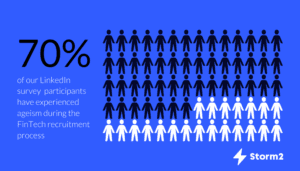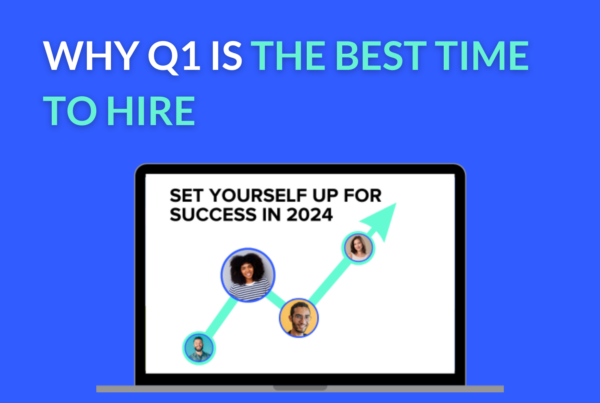Younger workers dominate the FinTech industry, with over half of the workforce aged 22 to 44 years old. The average age of a developer is 29 years old. Ageism is defined as the systematic stereotyping and prejudice of people based on their age. Startups are notorious for being a hotbed of young talent, with the overused media portrayal making it seem like you’re more likely to see a pool table than a person over 50.
Many of these ageist viewpoints are held by younger people. This forms a bias in the creation and design of complex systems. However, these same attitudes are sometimes shared by older employees. This results in a reluctance to apply for roles in disruptive FinTech sectors and an underestimation of their own performance or technological skills.
Age discrimination presents itself in a variety of ways. From being friendly ‘banter’, it can turn sinister including harassment of older workers, exclusion from corporate morale activities, and much more. Career development programmes are geared towards younger workers who are eager to move up the corporate ladder. They frequently overlook prospects for growth for older workers. From “30 Under 30” lists to the adoration of young entrepreneurs, few things are more prized in our culture than being both talented and young. The idea of the ‘youthful maverick’ or ‘just-out-of-Uni genius’ who breaches all the rules, rules, especially in Silicon Valley and the Technology industry at large.
Examples of Ageism
- Age-related remarks from colleagues or managers
- Feeling like they were receiving fewer call-backs because of their age
- Experiencing stress and anxiety about being laid off
- Feeling left out of planned corporate events
- Potential employers not willing to pay them more money to match their experience
- Experiencing imposter syndrome
- Not having good career development programs
Some Reasons Why Ageism Exists
- Low expectations of older workers
- Assumption that older people are not as dedicated to their workplaces but out more focus on family life which make them less attractive as employees
There is a general suspicion that ageist undercurrents are running throughout the FinTech industry, favouring the ultra-young and millennials at the expense of the older generations. Young (usually white men) faces of start-up founders like Mark Zuckerberg and other “tech bros” have become the symbol that tends to represent the tech industry.
Many FinTechs are currently focusing on techniques to recruit and retain “digital natives”: millennials and GenZ workers who grew up with everything digital. While gender and racial biases are often highlighted, the financial consequences of ageism has not received as much attention. Baby boomers have spent decades in the sector and have acquired skills, values, and tacit knowledge that make them great candidates for numerous roles. Data has shown that Baby Boomers have strong problem-solving, decision-making, and crisis management skills and are also good negotiators, thanks to their years of experience managing relationships with both clients and internal stakeholders.
Ageism manifests itself at every level of the recruitment process. From the initial phrasing of job adverts through the experience of being interviewed. Older candidates come from a variety of backgrounds, careers, and aspirations. However, many people believe that employers pigeonhole them based on clichés such as having ‘too much experience’ (29 percent), demonstrating lower levels of dedication, and being less physically or cognitively able.

Our data from LinkedIn highlighted that 70% of our audience has experienced ageism in the recruitment process.
According to a Forbes survey, people file more than 25,000 discrimination charges against employers each year. Some claims result from age discrimination against candidates aged 40+ during the hiring process, or being fired for no legal reason. It is unlawful to make recruiting and firing choices based on age, but age discrimination is common in FinTech.
According to Payscale the median age at Facebook is 28, at Google is 30, at LinkedIn and SalesForce is 29, and at Microsoft is 33. The average age in IT and tech is 29 in comparison to 49 in the public sector.
Whenever there’s too much of one type of person, the outcome is a lack of diversity. Examples include narrow ways of thinking, experience levels and perspective. It’s easy for unconscious bias, stereotypes, and a singular mindset to take over not only individual workplace cultures, but entire industries.
Why Having Employees Who Are Older Is Beneficial For Your FinTech

-
They are problem solvers
Mature staff are educated with sophisticated critical thinking and communication skills. They also know how to negotiate the workplace. More experienced employees have the necessary qualifications to accomplish the job and hence require less training than less experienced hires. There is no amount of training that can compensate for 20 years of experience.
-
They make great mentors
Experienced workers are more self-assured and have a greater awareness of workplace politics. They can act as mentors to younger employees, which offers an organization with “intangible” benefits. Companies that have good mentors will save money on training and have lower employee turnover rates.
-
They have strong networks
Senior hires will bring large networks of former supervisors, co-workers, family, friends, business partners, and vendors with them. They can supply reliable referrals for other available vacancies to their employers.
Ways To Tackle Ageism
-
Work For Yourself
This is a terrific path for you as long as you stay current with relevant skills, focus on establishing a strong professional network, and build a decent portfolio.
-
Seek To Adapt
Learning new things is one of the best things you can do for yourself. Demonstrate to potential employers that you are a lifelong learner. This will reflect that you still have a strong interest and passion for the field.
-
Offer Expertise
If you wish to take a slightly different strategy, instead of learning a variety of tools, technologies, and languages, focus on one of them in depth.
-
Network
Make use of your existing network. You should also try to broaden your network. You can meet new people in the field by joining online forums, groups, and pages. Connect with intriguing people on LinkedIn and go to networking events.
-
Understand Your Legal Protections
Employers who discriminate against you because of your age are breaking the law. You should become acquainted with the Age Discrimination in Employment Act so that you can notice and respond to age discrimination in the workplace.
The Additional Challenge Of Being A Woman
Working in FinTech as a woman over the age of 30 is more challenging than it is for a man over the age of 30. There is systemic gender bias. Ageing in an industry that promotes youth makes continued success much more difficult. Both these factors make it more difficult for mature women to enter such a young and ale dominated market.






